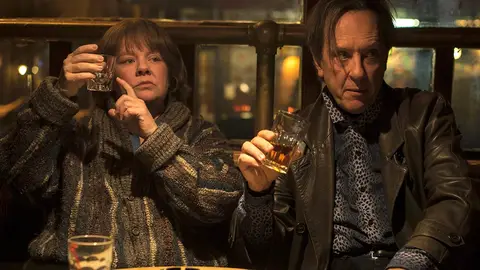The Homo-Saturated Appeal of "Can You Ever Forgive Me?"

Okay, so just a few weeks ago I told you that Wash Westmoreland’s new film Colette was “one of the queerest films of the year.” Not to overuse that line, but…
In an uncanny parallel, here we have another incredibly queer film that, like Colette, is a period drama about a queer female author with a complicated relationship to her writing who is being portrayed by a big Hollywood movie star. While Keira Knightley’s bisexual Colette essentially ghostwrites her most famous novels in the 1900s and lets her husband take the credit, Melissa McCarthy’s 1990s lesbian celebrity biographer Lee Israel goes around brilliantly forging and selling letters by famous dead authors.
We know we’re in for a fun ride from the very first scene when Lee, swigging a scotch on the rocks in the newsroom, tells her boss to fuck off. Lee is summarily fired and life goes downhill from there: her agent won’t return her calls, she’s three months behind on rent, and she owes so much money to the vet that they refuse to help her sick cat.
A crotchety alcoholic hermit, Lee goes to drown her sorrows at the corner bar (not just any bar mind you, but Julius’, the oldest operating gay bar in New York City). The bar scene is a perfect illustration of one of the greatest things about this film: It’s utterly homo-saturated for those who know where to look. Straight viewers will see Lee at a corner bar—nothing new about that. Gay audiences (or at least those who know their queer New York City history) will be saying to themselves, “She's at Julius'!”
Enter the fabulous Richard E. Grant as the charming gay rambler Jack Hock. With his self-described “sparkly blue eyes and street smarts,” the seemingly homeless Jack is ever-cruising and makes the perfect smart-ass sidekick. It’s hard to think of a more entertaining depiction of friendship between a gay man and a lesbian on screen (though Meryl Streep and Ed Harris in The Hours is a good one.)
In one of their many tremendous exchanges, Lee explains to Jack that she’s writing a new celebrity biography. “Are you sure you’re really a fag?” She snarls back at him when he replies that he doesn’t know who Fanny Brice is.
When her agent Marjorie (Jane Curtin) tells her to chuck the Fanny Brice project and find some other way to make a living, Lee embarks on a life of literary crime. Using a different typewriter for each author, she composes and sells forged correspondences packed with characteristically catty bon mots that really do sound like they could have been written by Noel Coward, Dorothy Parker, et al. The plot thickens when—after some of her buyers become suspicious—Jack begins helping Lee sell the letters.
Lee complains to Jack about her ex-girlfriend (Anna Deavere Smith, who shows up in a fun cameo later in the film) and then, just as it seems there’s no hope for Lee’s love life, she finds a glimmer of flirtation with the local bookshop owner, Anna (Dolly Wells). In even more early ‘90s NYC gay-life realness, Jack and Lee go out for drinks to Joe’s Pub where none other than Mx Justin Vivian Bond is performing (though the film is supposed to be set in 1991 and in real life Bond didn’t move from San Francisco to New York City until 1994). Factual errors aside, Bond sings a lovely song introduced with the caustic wit: “This next song goes out to all the agoraphobic junkies who couldn’t be here tonight.”
We’re rooting for Lee all along, though we can see what a crazy, complicated crank she is (“I’m a 51-year-old who likes cats better than people,” she rants at one point). There’s no question that when she starts channeling Dorothy Parker she really hits her stride. At one point she observes, “I’m a better Dorothy Parker than Dorothy Parker.”
We know her scheme can’t go on forever, and that Lee’s downfall is imminent. The letter that marks the beginning of the end is one in which she impersonates Noel Coward and has him referencing his homosexuality. The collector who purchases the correspondence identifies it as a fake because Coward was so closeted he never would have written such a thing. It's all downhill from there.
The unsurprising spoiler alert: With her arraignment imminent, Lee’s lawyer urges her to get an actual job, start doing community service, and go to AA. Also not a surprise: She starts volunteering at a cat shelter and goes to Julius’—not 12-Step—where she and Jack reach a caustic resolution and we get to have a relatively happy, gay-lesbian friendship ending.
Credit where credit is due: Huge kudos to adapted screenplay co-writers Nicole Holofcener and Jeff Whitty (the Tony Award-winning gay co-writer of the musical, Avenue Q); and also to director Marielle Heller (whose next directing project is the narrative feature adaptation of Ben Cotner and Ryan White’s acclaimed documentary, The Case Against 8).
But of course, first and foremost, we’re all indebted to author Lee Israel who lived and told the tale—and who deserves not just our forgiveness, but also our gratitude.
" text="Melissa McCarthy on How 'Can You Ever Forgive Me?' Spotlights Ageist, Sexist Attitudes Toward Women"]





